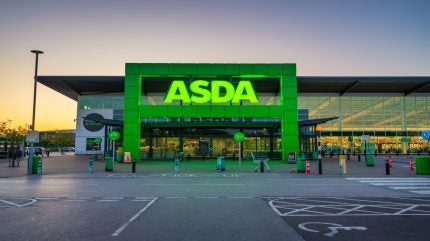
UK grocer Asda has devised a supply-chain finance scheme designed to encourage its suppliers make “progress” on sustainability and share data.
Asda, the UK’s third-largest grocery retailer by sales, has teamed up with banking group Lloyds on an initiative to “drive sustainability progress and performance within its supply chain”.

Discover B2B Marketing That Performs
Combine business intelligence and editorial excellence to reach engaged professionals across 36 leading media platforms.
CFO Michael Gleeson said the scheme offers suppliers “competitive financing that rewards progress and encourages transparency across our supply base”.
Sustainability ratings platform EcoVadis will the ESG performance of Asda’s suppliers. Asda said it already asks its largest suppliers – companies accountable for around 80% of its product carbon emissions – to share sustainability data with EcoVadis.
The retailer said it will “provide access to preferential rates for numerous suppliers on a tiered basis, dependent on sustainability performance against a range of KPIs”.
Suppliers that meet the programme’s requirements can benefit from October. Companies that “choose not to engage will remain on current payment terms and default rates”, Asda added.

US Tariffs are shifting - will you react or anticipate?
Don’t let policy changes catch you off guard. Stay proactive with real-time data and expert analysis.
By GlobalDataLloyds head of consumer Aled Patchett said: “We’re proud to have supported Asda for many years in its work to build further resilience in its supply chain. Our existing programme has successfully supported suppliers over the years and converting it to reward sustainability efforts will not only deepen support for British businesses, it will also support Asda in meeting its own ESG ambitions.”
According to Asda’s corporate website, the retailer’s stated aim for its Scope 1 and 2 emissions is “delivering net zero operations by 2040”.
On Scope 3, Asda says: “We have developed a carbon transition plan, aligned with science-based targets to support the delivery of net zero by 2050.”
It adds: “With 98% of our emissions from Scope 3, working collaboratively with suppliers and partners to drive climate action is imperative.”





